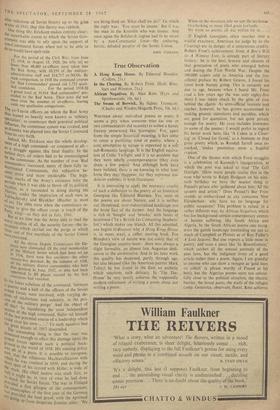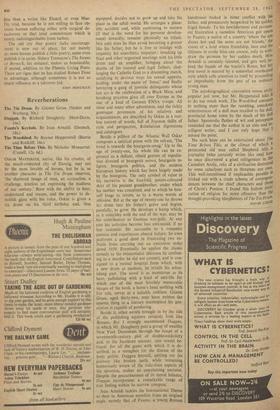True Observation
A Hong Kong House. By Edmund Blunden. (Collins, 21s.) The Swans of Berwick. By Sidney Tremayne. (Chatto and Windus:Hogarth Press, 10s. 6d.) WHETHER about individual poems or poets, it seems a pity when someone tries (as one or two commentators did recently) to soften a handy literary swearword like 'Georgian: For, apart from the simple historical meaning, it has come to cover a particular kind of poetry, where a cosy absorption in nature is expressed in a soft sub-Romantic langilage. It is the English equiva- lent of Celtic Twilight, and it is no accident that they were nearly contemporaneous (they even share a few poets). And althongh both have been isolated, there is no knowing in what later form they may reappear, for they represent ten- dencies endemic in both literatures.
It is interesting to apply the necessary cruelty of such a definition to the poetry of an historical Georgian like Edmund Blunden. Yes,-most of the poems are about Nature, and it is neither our threatened, over-industrialised landscape nor the brute fact of the farmer. And the language is rich in 'boughs' and 'brooks,' with bouts of heartiness ('To a British Jar Containing Stephens' Ink') which makes one blanch. All this admitted, one begins to discover why A Hong Kong House is, in many ways, a rather moving book. For Blunden's view of nature was not solely that of the Georgian country-lover: there was always a slight formality, an almost late Augustan dedi- cation to the unobtrusive. And in his later work this quality has deepened, partly through age, but also because (like the American painter Mark Tobey) he has found in the East an wsthetic which sanctions such delicacy. In 'The Tea- House' he very nearly achieves the supposedly modern refinement of writing a poem about nut writing a poem :
When on the mountain side we saw the tea-house Overlooking so many tilled green lowlands, We wrote no poems; all was written for us. . . .
If English Georgians often weather into a wistful exactness, American (to judge by In the Clearing) are in danger of a sententious crudity. Robert Frost's achievement, from A Boy's Will to A Witness Tree, is already part of literary history: he is the best, bravest and clearest of that generation of poets who emerged before and during the First World War. Despite the 100.000 copies sold in America and the (ex- cellent) preface by Robert Graves, I found his latest book bumpy going. This is certainly not due to age, because when I heard Mr. Frost read a few years ago (he was only eighty-five then) I was taken aback by the glint of iron behind the charm. As semi-official laureate and teacher, however, he has grown accustomed to making gnomic statements and parables, which arc good for quotation, but not quite private enough for poetry. He even includes footnotes to some of the poems: I would prefer to regard his better work here, like 'A Cabin in a Clear- ing' or 'Closed for Good,' as a footnote to that great poetry which, as Randall Jarrell once re- marked, 'makes pessimism seem a hopeful evasion.'
One of the themes with which Frost struggles is a celebration of Kennedy's inauguration, at which the poet was asked to read 'The Gift Outright.' (How many people realise that in the man who wrote to Ralph Hodgson on his nine- tieth birthday we have the nearest thing to Pound's prince who 'gathered about him/All the savants and artists'? Does Pound?) But Frost sounds as embarrassed as any conscious New Elizabethan: why, have we no language for public occasions? This problem is raised, in a rather different way, by African Negatives, which - has for background certain contemporary centres of human suffering, like South Africa and Algeria. In the South African poems one recog- nises the garish landscape (reminding me not so much of Campbell or Plomer as of Roy Fuller's A Lost Season). But one expects a little more in poetry, and even a piece like 'In Bloemfontein,' which catches all the sensual anomaly of the pass laws, has the indignant irony of a good article rather than a poem. Again, I am grateful to anyone who can show a mosque as 'gold stars on cobalt' (a phrase worthy of Pound at his best), but the Algerian poems seem too colour- fully close to the politidal situation, the electric barrier, the bored paras, the waifs of the refugee camp. Generous, observant, fluent, Ross achieves
less than a writer like Eluard, or even Mac-
-mid, because he is not willing to face ob- vious human suffering either with surgical de- tachment or that total commitment which is nearly indistinguishable from bathos.
The old cry that poetry lacks encourage- ment is now out of place, for not merely do most houses publish a little poetry, some even publish it in series. Sidney Tremayne's The Swans of Berwick, for instance, makes an honourable, if muted, addition to the Phoenix Living Poets. There are signs that he has studied Robert Frost to advantage, although sometimes it is not so much influence as a takeover bid. .
JOHN MONTAGUE



































 Previous page
Previous page